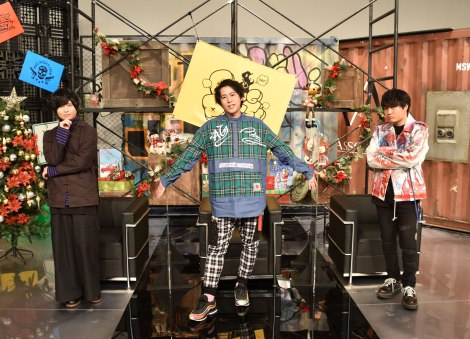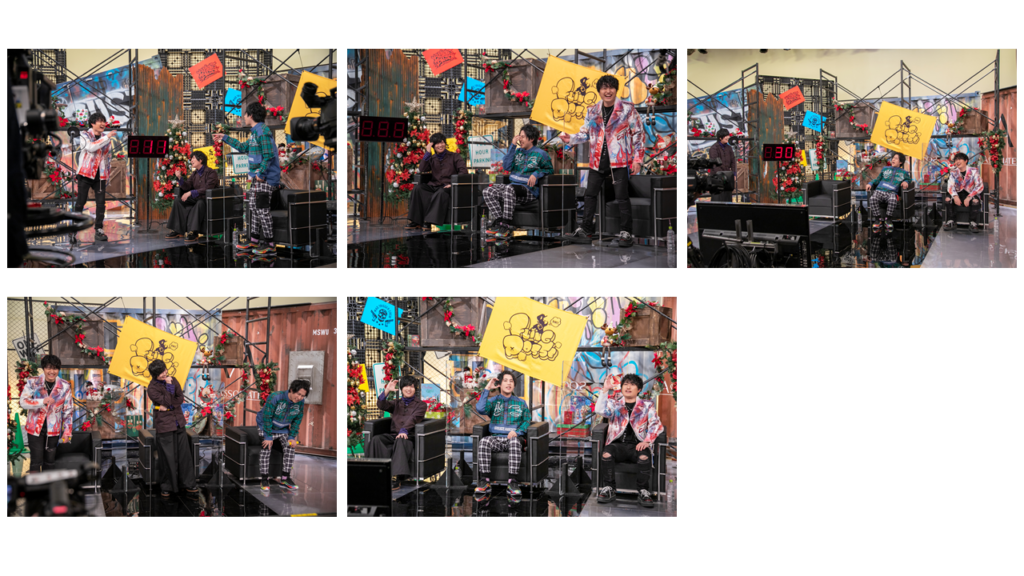Less personal tweets (not translating them in the interest of time):
Author: ミーナ
[Interview] Natalie – The Story of a Closed World in Saito Soma’s “my beautiful valentine”
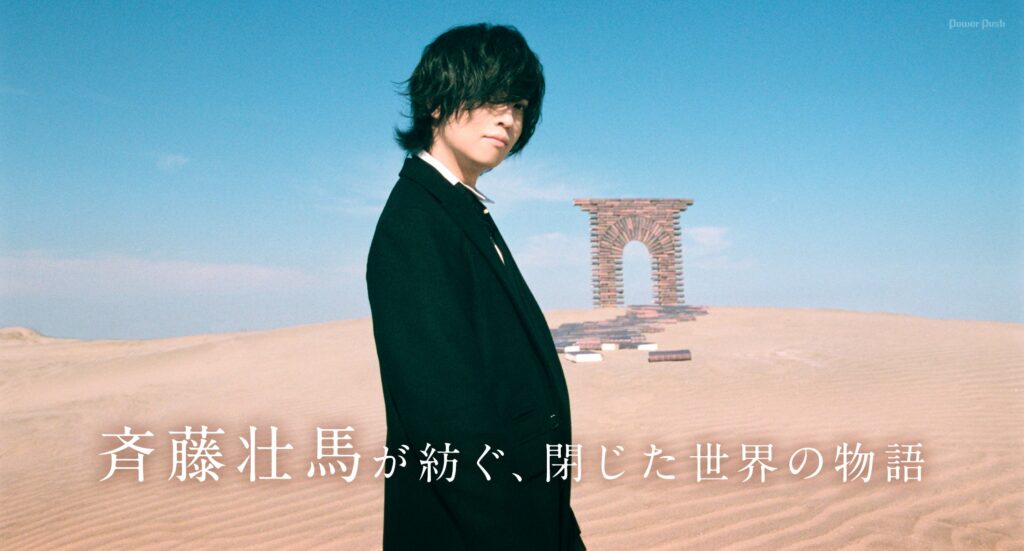
Published: 2022/2/9
Original URL: https://natalie.mu/music/pp/saitosoma02
He bought a guitar on the last day of his tour
—Last year, you had your first live tour “We are in bloom!” in April and May, and I could feel the groove between you and the band members. How much rehearsal did you do?
There were two rehearsals. The band members were real pros, so it was bound to work out one way or another *laughs*. I was in a band as a hobby when I was a teenager, so I always wanted to sing live with a band. As I toured with the band members, I could feel our groove improving with each performance. It was really fun. Unfortunately we couldn’t go to Osaka (because of the state of emergency declaration), but I want to make sure to go there next time if possible.
—Speaking of the concert, the long arrangement of “Isana” and your shout during the song left a deep impression.
Thank you. “Isana” was an 8-minute song to begin with, but I asked, “Can we make it over 10 minutes long for the concert?” and extended the outro. I think it’s a pretty song, but I hoped that by listening to it live with high sound pressure, people would feel that it was more than just “a pretty song.” I had a lot of fun performing it too.

—During the tour, you had your 30th birthday. What kind of milestone do you consider that to be?
When I was a kid, I thought that a 30-year-old was very much an adult, but that’s not the case at all *laughs*. After turning 30, I still think I’m careless and childish, but instead of trying not to seem that way, I think it’s necessary to accept myself for who I am. It’s important to accept the childishness inside of me. Speaking of which, on the last day of the tour, I was looking at guitars during break time because I was thinking of buying another one. After the concert, I bought the one that struck a chord with me. I’m the kind of person who immediately buys what he wants, and I’m going to cherish that fact.
—So in your 30s, you’re going to accept yourself for who you are and follow your heart.
Right. Between the band members and the people at SACRA MUSIC, I’ve met a great team which I’m grateful for. So it was kind of like, “I’ll give back by buying a guitar!”
—Which guitar did you buy?
The Fender Strat Jazz Deluxe. Different guitars can make different sounds depending on their shape, and since I like shoegaze music, I wanted a guitar with a vibrato arm that could create nice, fluctuating sounds.
—Did you use that guitar in the recording of my beautiful valentine?
Not this time, but I think I’ll be able to use it in the future since it’s a great-sounding guitar. I’m looking forward to the day when I can debut it.
The final valentine, the final “mbv”
—During the in bloom interview, I believe you said you wanted to pursue deeper music, and my beautiful valentine has a consistently deep and dark world view. It made me think, “Saito-san’s core has finally come out.”
Hahaha *laughs*, thank you.
—When did production begin?
I had been sending SACRA MUSIC demos since early 2021 to let them know what I had, but the actual production began in August 2021. Since my schedule was packed with my live tour and concerts for the series I’m in, it was difficult to devote myself to creating music. I had a major concert in August, and after that, I started working on the EP in earnest.
—When you first began your artist career, you focused on pop and ease of listening, but my beautiful valentine seems like it was created without paying any attention to those things.
I did try to keep it listenable as pop music, but like you said, I didn’t think much about making it easy to understand.
—Did you have an initial blueprint for how it would turn out?
Unlike albums and singles, I think of EPs as a place where I can do whatever I like. It was the same with my previous EP, my blue vacation (released December 2019). So, I decided to go for a dark feeling from pretty much the very beginning.
—Did the title my beautiful valentine come from My Bloody Valentine?
Yes. my blue vacation also had the initials “mbv,” so I thought I’d follow that trend. I pretty much copied it this time, though *laughs*. As we were working on the EP, we discussed the release date and decided to release it close to Valentine’s Day. That made it so that I could carry on with the MBV theme, and I wanted to give it an ironic feel. The title is my beautiful valentine, but I don’t write songs that simply follow the image suggested by the title. Fortunately the listeners think the same way, so I wanted to give them the impression that “if he chose this title, it surely can’t just be made up of sparkly songs.” But I think I’ll abandon the “mbv” restriction when the time comes for the 3rd EP, because I can’t think of anything else *laughs*. This is the final valentine—the final “mbv.”
—So the title was decided from the beginning of production. You said that for in bloom, it was decided quite late.
I often title my works at the end of production. In that sense, it feels like this time production proceeded based on the concept of “my beautiful valentine.”
—And it’s a conceptual CD that reflects that. I think artists often take in input and output it through their work, and in your case, I believe you’re influenced by both music and literature. Were there any works that influenced my beautiful valentine?
Yes, both music and literature. Although if we’re talking about “taking in input,” I actually haven’t been doing much of that lately… but I think my beautiful valentine does reflect the music, words, and moods that I like right now. It also has a lot of songs that call to mind certain books and authors. For example, “Rhapsody Inferno” reminds me of (J.D.) Salinger and Kurt Vonnegut; “Genjitsu” is Kajii Motojirou. “Uzumibi” was inspired by Cormac McCarthy’s The Road, a story about a father and son walking through a world that has fallen into ruin. Also, “Zakuro” reminds me of Kurahashi Yumiko. If anyone wants to speculate about the songs based on this interview, reading Salinger for Rhapsody Inferno might be surprisingly useful.
He’s waiting for tie-ups!
—Something I noticed when reviewing your past releases for this interview was that you haven’t had many tie-up songs. “Hikari Tatsu Ame” (the opening theme for the anime Katsugeki Touken Ranbu) was the only one.
Yes, there was only that one.
—I’m sure the label could’ve given you more tie-ups if they wanted to. To me it felt like they didn’t because they wanted to respect what came from within you, but what do you think?
It’s true, and I think that releasing music without tie-ups is a fairly rare thing from a business perspective. As you said, I’ve been telling SACRA MUSIC that I want to give the music itself my undivided attention, and I think I’ve truly accomplished that with my beautiful valentine. Now that I’ve expressed a closed world, I want to do the opposite and express something open. Normally you can’t just get a tie-up by asking for one, but I hope I’ll have a chance to in the future. I’ll be waiting! *laughs*
—”Hikari Tatsu Ame” wasn’t written by you, so I’m looking forward to seeing what you’ll come up with if you do get a tie-up opportunity. Now, back to my beautiful valentine. Let’s start with the first track, “Rhapsody Inferno”. TRI4TH’s Orita Yusuke was on trumpet and Fujita Junnosuke was on sax.
This song was originally inspired by The Pogues, an Irish punk band. The chorus is sung as a large group and everyone plays the kazoo during the interlude. I told the arranger, Saku-san, that I wanted to add a horn section, and he arranged it beautifully. The lyrics are less “it’s important to laugh no matter how difficult the situation is” and more “these people are just dancing in hell.” I wanted a song with a band-like groove and pointy words.
—Were you present for the instrument recording?
It was difficult to be there for the whole thing, but as I mentioned, we all recorded the kazoos and hand claps together. I’m really grateful that we were able to do that. It was fun. I wanted the song to evoke the feeling of a large band performing in a small live venue or cafe, so it was even better that we all got to record it together.
—It’s a groovy song that does convey that feeling. For the second track, “Naisho-banashi”, I liked how the lyrics rhymed and fit together, with words like “chakkari,” “gakkari,” and “nattari.”
This song has a 16-beat groove, so it was surprisingly difficult to write the lyrics. I wanted to focus on the rhythm and making them feel good to listen to, but focusing on only those was making the contents of the lyrics fall apart, so I struggled with balancing rhythm and meaning. Even during the recording, I thought, “Were these lyrics the right choice?” but as I listened to the completed song, it grew on me more and more. I hope you’ll enjoy this song’s rhythm.
—It’s difficult to decide whether to go for feeling or meaning. By the way, when you’re writing songs, do you write the music first or the lyrics?
Currently, the music usually comes first.
—Was that the case for “Naisho-banashi” too?
Yes. I don’t think it really affected anything, but the ideal situation is when the music and lyrics come to my mind at the same time, because it’s the most natural. Even if they don’t come at the same time, I try my best to maintain a state where lyrics can give rise to music and music can give rise to lyrics. Occasionally I do manage to come up with both at the same time.
—Are there any songs where you came up with the music and the lyrics at the same time?
Not in this EP, but it was the case for “Date” and “carpool”. For “Date”, I was taking the train from my home to the studio, and by the time I got there I already had the short size done in my head. That was neat.
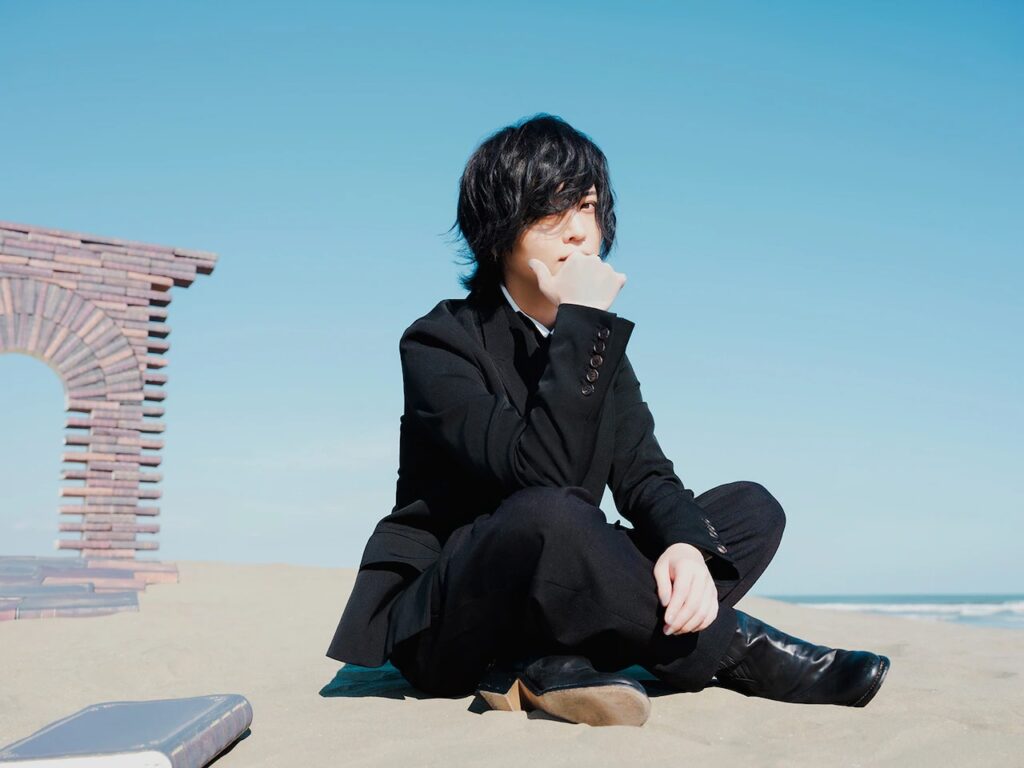
It’s a daydream, so that’s just how it is
—For “(Liminal Space) Daydream”, you don’t read aloud the part in brackets as part of the name, right?
Yes. I wrote a song before called “sunday morning (catastrophe)”, and the part in brackets isn’t read aloud for that one either. When I was introducing it on my radio, I forgot how that part was pronounced *laughs*. So for this song, I won’t read it!
—”Liminal Space” is a difficult term to express in Japanese. Like it suggests, this song is uncanny; it sounds bright and refreshing but the lyrics and the outro are unsettling, giving it a contradictory impression.
It’s a daydream, so that’s just how it is *laughs*. I was very picky about the last part, so I’m glad to hear that. I was listening to a song by a certain artist and told Saku-san, “I want you to do it like this.” For this song, I went to the instrument recording and played the rhythm guitar. When we were discussing how to end off the song, we all mulled over it together. Normally I don’t say much in response to what I’m given, so I kept quiet for a while, thinking I’d leave it to them. But I did tell them what I was insistent on and said I wanted it to fade out, leaving only the piano. Everyone laughed a lot. They were like, “Ahhh, scary!” *laughs*. I think the lyrics are quite out there, but they also feel surprisingly kind, or rather, true to what they say. Like, when it says “it’s bugging out,” it really does bug out. I was aiming for an indie pop feel with the song, so it was fun to play the instruments with everyone.
—When you ask Saku-san to arrange something, how do you normally convey the nuances? Do you give him references?
Yes, I give him references and I include what I can at the demo stage. I think “(Liminal Space) Daydream” is mostly the same as the demo. That’s the case with some songs, but with other songs, Saku-san does incredible arranging work. “Rhapsody Inferno” is quite different from the demo. I’m thankful that Saku-san always does the best arrangement for each song.
—Saku-san was the arranger for six songs this time. It feels like you two are a tag team. In the next song, “Genjitsu”, the strings and your high-tone voice are beautiful. How did the creation process go?
I thought of the looping intro chords first, and it kind of felt like a wintry chord progression. The demo was made relatively late compared to the other songs in my beautiful valentine, but production went smoothly from there. I was able to write the lyrics in one day. I had decided to write them carefully, wanting to make music that was similar to Yuming-san (Matsutoya Yumi), GARNET CROW, and Spitz. Personally I thought it might be better suited for an album instead of this EP, but I was happy when Saku-san and the people from SACRA MUSIC said it was a really good song.
—Is the music video for this song yet to be filmed? (This interview was conducted in early January.)
Yes. I’ve roughly decided how I want it to be filmed. It’s probably going to be a story about sisterhood.
Heavier, darker shoegazing than “Isana”
—The fifth track, “Uzumibi”, stands out with its shoegazing sound. You said earlier that the lyrics are reminiscent of Cormac McCarthy.
I think this song has relatively straightforward lyrics too. It’s the feeling of, “it wasn’t supposed to be this way, but my thoughts are being burned up and turned into ash.” I originally thought that this song would be the leading track, but it was difficult to cut out a short version, so I gave up on making it the leading track because it was annoying *laughs*. I think this is the best-written song in this EP.
—I mentioned earlier that the live performance of “Isana” was stellar, and I’m also looking forward to the live arrangement of “Uzumibi”.
Thank you. “Isana” has a shoegazing feel as well, but it’s a clean and beautiful one. So I wanted to make a shoegaze song that was a bit heavier and darker, and I came up with “Uzumibi”. I was able to attend the instrument recording, although it was almost over by the time I got there. The drums were so cool; I could really feel the professional technique. I was happy that they turned my demo into something so cool.
—In addition to the instruments, the layered vocals were rich too.
My songs often have layered vocals. Since “Uzumibi” is a shoegaze song, I thought that instead of pushing forward with the power of a single voice, it would be better to create a spatial effect by overlapping multiple voices.
—The first five songs had instrumentalists participating, but the sixth song, “Zakuro”, moves away from the band feeling. What stood out to me was the vocal approach where it sounds like you’re trying not to sing too strongly.
I believe that each song has a way of singing that suits it, so I used various vocal approaches for my beautiful valentine as well. For “Zakuro”, it felt like it wouldn’t be right if I sang it too clearly, so I was conscious of that. I wanted a listless or decadent-sounding singing voice.
—What do you keep in mind when it comes to vocal approaches?
I have opportunities to sing as a voice actor too, and in those cases, I try to sing as well as I can while staying in character. But for my own songs, I have this weird logic where I think, “It’s cooler if I don’t sing too well.” There’s some conflict there, but in general, I try to sing in the way that’s best for the song. For example, for “Rhapsody Inferno” I sang in an emotional, agitated way, but “Zakuro” is about the singer’s existence being over, so I didn’t think there was a need to sing it loudly.
—Each song in my beautiful valentine is like a story with its own protagonist, so I can see why you’d use a different singing approach for each one. It strengthens my impression of this EP as a work created by an artist rather than a voice actor.
I’m very happy to hear that. Thank you.
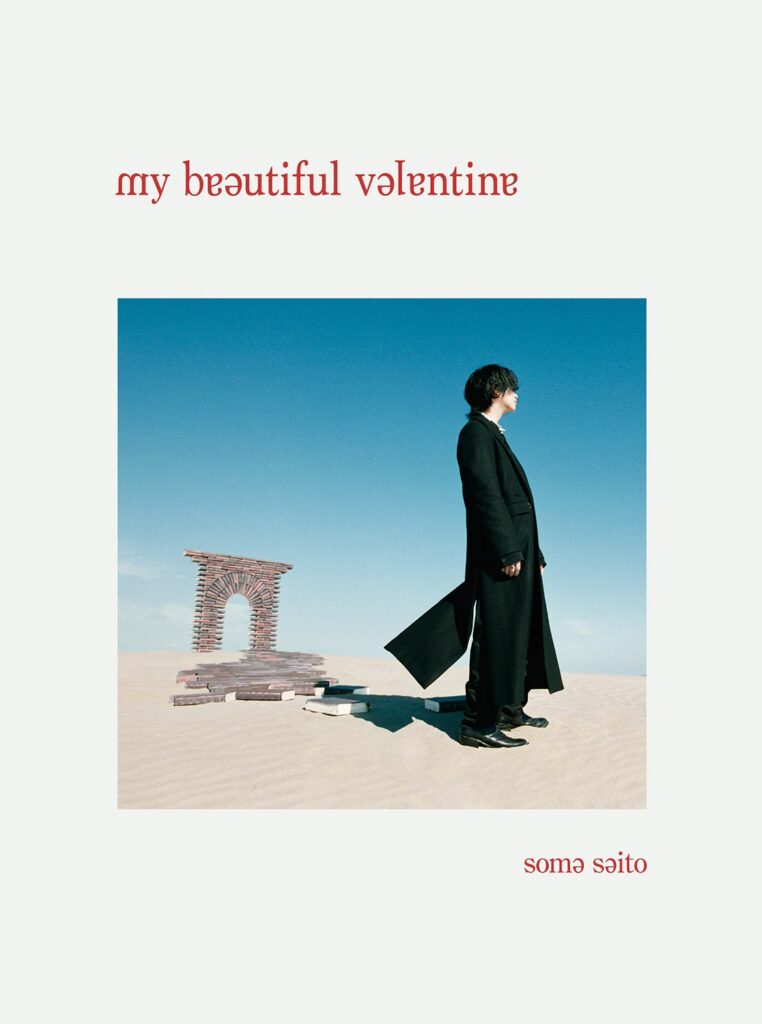
—You posted on Twitter that this EP was full of new ideas you hadn’t tried before. Were you referring to the secret track “Kudryavka” that’s only included with the disc version?
There were several, such as making a music video that I don’t appear in and my instrumental performances. But the secret track was the biggest one because I did both the arranging and the instrumental performance by myself. It’s not complex enough to be called an arrangement, but I did hand over what I’d created on my computer as-is. The vocals were re-recorded, though. The demo itself was submitted quite early. my beautiful valentine had a tight production schedule, and when we were all discussing what to do for the secret track, we started to think that this song would be good for that. In a way, it might be my most personal and minimalistic song.
—It feels introspective.
Exactly.
—The connection between “Kudryavka” and the title my beautiful valentine make me feel that the EP is only complete after listening to this song.
This song has the most valentine elements, like the word “chocolate.” When you listen to my beautiful valentine, I imagine tracks 4, 5, and 6 have a dark impression, and this is an even darker song that comes after those. It might be an old-fashioned way of thinking in this day and age, but I’m from a generation that really loved listening to a CD in order, so I’d appreciate it if people who bought the physical release listened to the songs in order from 1 to 7. I think listening to them in that order brings out each song’s appeal the best.
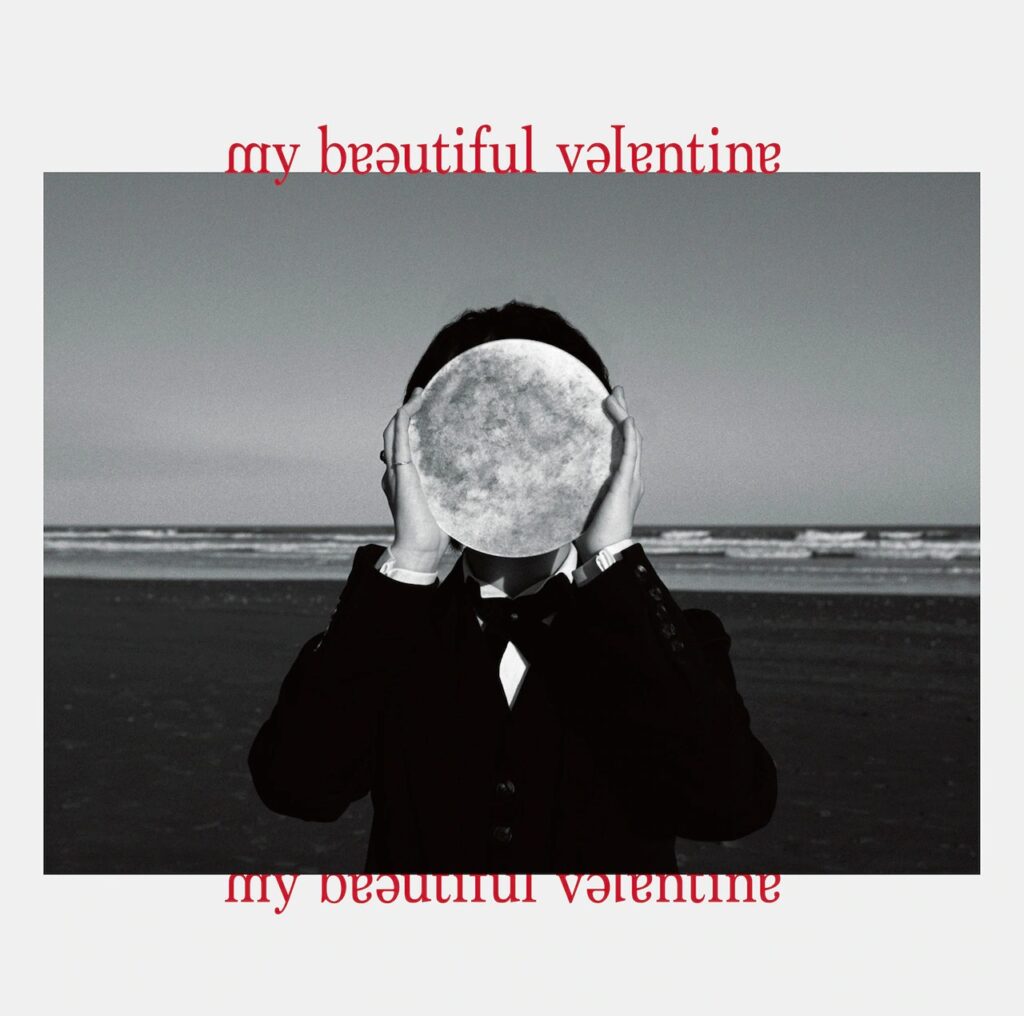
—Thank you. Lastly, this June will be the fifth anniversary of your artist debut. Please tell us about your future plans.
I’ve been able to do this for the past five years thanks to the support of so many people, so first, I’d like to express my gratitude. I have various ideas for the future. I don’t know what the state of the world will be, but I might be able to perform live again. I also think it could be interesting to sing songs that weren’t written by myself for a change; to ask others to write music and lyrics for me and try singing them. I’d also like to try collaborating with other vocalists. I have a lot of ideas, and if possible, I’d like my fifth year and onward to progress in a way that opens up to the world.
[Radio] Saito Soma Strange dayS #50
Broadcast: 2021/12/10 on Cho!A&G+
Archive: https://abema.tv/video/episode/390-7_s1_p50
Introduction
Today’s date is Friday, December 10. How are you all doing?
Good evening, Saito Soma here. If you can believe it, this program has reached episode 50–thank you so much. I already mentioned this a little while back, but after doing this for about a year, it finally feels like I’ve solidified my style of solo radio. I hope it will continue for a long time to come.
♪ memento
TRUE Self
Good evening once again. What I’ve been interested in recently is “TRUE Self.” At my agency, there’s a guy named Nakajima Yoshiki who’s been a great help to me, both at work and as a friend. He’s producing a brand called “TRUE Self,” and I met him the other day so I procured a lot of stock *laughs*. Hopefully I’ll be able to post a picture later.
I modeled for his brand once in the past, but this time I couldn’t because of scheduling. The items are really good, though. I even asked him for a couple of the pieces he didn’t give me this time.
Everyone’s been doing all kinds of different things; even though acting is their main focus, some people are producing things as well. It really is amazing how broad the “voice actor” profession has become. Okay, yeah, the same goes for me *laughs*. I’ve been given the opportunity to do a lot of different things, which I’m really thankful for.
Now then, let’s begin “Saito Soma Strange dayS”. Thank you for tuning in today, everyone.
2nd EP: my beautiful valentine
Once again, this is Saito Soma. Now then, let’s get right to what you’ve all been waiting for. Today, I have a very very important announcement! Saito Soma will be releasing a second EP! *clap clap clap*
It was already obvious that it was going to be some kind of music, though. Anyway, I kept you waiting for a long time, but I can finally reveal more information about my new project.
First off, the title is my beautiful valentine. This is my second EP, and, as I’m sure you’ve already surmised, the name is taken from My Bloody Valentine. Now, my first EP was my blue vacation, meaning that both of them have the initials “MBV,” which I think is a dangerous trend to set, but well, that’s what it is.
Concept-wise, I’d like to consider my albums and singles the music of the “open” Saito Soma, covering a broader range of styles, while my EPs are a little deeper, corresponding to my more hardcore tastes. I think this release might be the darkest out of all of them so far.
As an aside, my producer at the label told me that I can talk about anything I want, which actually makes this harder for me, because I don’t know how much I should say. Whatever I talk about now is all going to become official news. That’s so scary! *laughs*
Scariness aside, let me reveal the release date first. It’s scheduled for February 9, 2022. As you’d expect, it’s close to Valentine’s Day. But, well, this is my music we’re talking about, so it’s not going to be what you’d normally associate with the phrase “my beautiful valentine.” There are songs that are unlike anything I’ve released so far, and I think the lyrics are also a little different.
The recordings and preparation work are going great, and we’re trying several new things too. If I could just say one thing, the recordings are really difficult every time. It’s the usual, “Who wrote this song?!”
I think we’ll be able to present the songs soon. Normally, I’d announce the song titles here, but they haven’t all been decided yet. As I mentioned a little while back, unexpected foreshadowing keeps happening in different places. I think it’s safe to give one example, so on Dameraji, Kaito-kun said something like, “The pomegranate in my heart is bursting,” which really startled me at the time. One of my new songs is called “Pomegranate,” so I was like, “My thoughts are being spied on!” I was pretty terrified of Kaito-kun when that happened… Naturally, the song doesn’t have anything to do with Ishikawa-san. “carpool” was also unrelated to Ishikawa-san.
The vague image I had for this EP was “a collection of weird tales.” I’m a fan of the Cthulhu mythos, and the author, Lovecraft-san, published that series in a magazine called Weird Tales. As such, this EP has a rather “dark fantasy” feel.
I did the photo shoot for the booklet and whatnot, and let me tell you, it’s really something. I’m really glad I grew out my hair *laughs* even though I said last week that I wanted to cut it so badly. The MV is also quite out-there. I think all of the details will be released gradually over the next weeks. We’ve created something really good, if I do say so myself, so please wait for more information.
After this program, the news will be posted to social media and the official website. Oh, that means the artist photo will be released too, right? It’s really nice. If I may say one thing in advance, it’s a little on the “surrealism” side. My keyword for it was “dépaysement,” so I’d appreciate it if you looked that up.
The CD bonuses will also be posted on social media and the official website, so please take a look there.
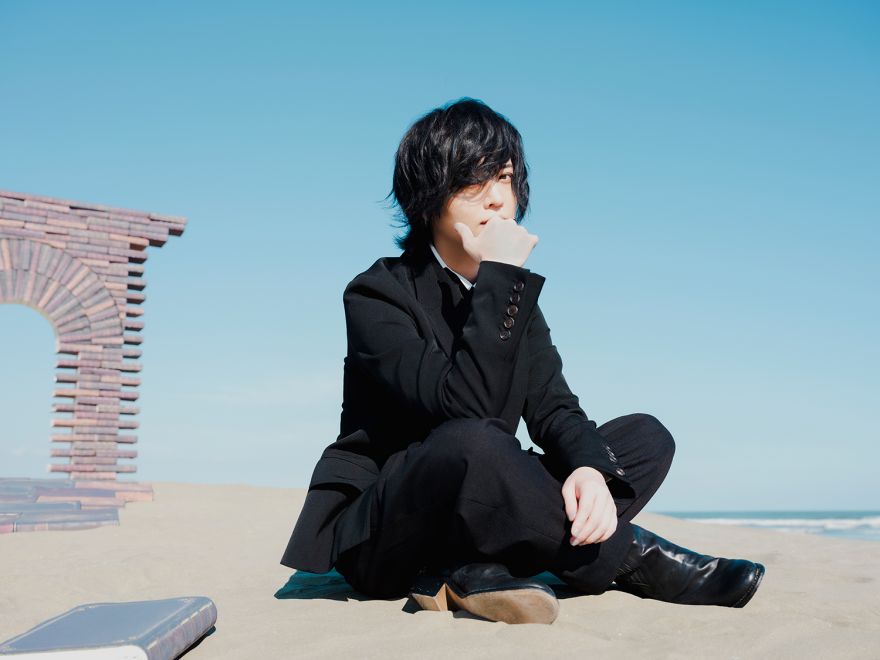
Gathering industry lingo
Now I’ll be reading some letters from listeners.
This one is from “I want to sit in the kotatsu and eat tangerines”-san. Thank you for your letter.
“Soma-kun, staff members, good evening.”
Good evening.
“Thank you for providing an enjoyable program every time.”
Same here.
“On your radio the other day, you said you were looking for industry lingo–“
Yes!
“–so I’m sending one right away. I work as a pastry chef, and in the patisserie industry we have an interesting term called naku.”
What’s naku? As in… calling tiles in mahjong? *laughs*
“I’m sure you’ve seen white powdered sugar on cakes and whatnot. If one were to use regular powdered sugar, the sugar would absorb the moisture and turn into syrup. We call that state ‘naku’; in other words, ‘naku’ = ‘melting.’ When I first started in this industry, I was struggling to keep up with all of the unfamiliar lingo, but now I’m using it on a daily basis without having to ask what anything means. When I think about that, I feel like I’ve really become a part of the industry.”
Ohhh… This is the kind of thing I was waiting for. The answer makes a lot of sense, though. Sorry to make this about me, but I also use naku with a very similar nuance to “melting” in my lyrics. I really love the concepts of “melting” and “blending.”
This is interesting because the verb naku probably also means completely different things in other industries. I think I’ll take all of your submissions and publish them *laughs* so please keep sending them in.
Next, a letter from “Meaningful Coincidence”-san. Thank you for your letter.
“Soma-kun, staff members, good evening. Thank you for providing this wonderful time every week. I’m sending this letter because on your radio the other day, you said you were looking for industry lingo.”
Thank you very much.
“I’m a dental hygienist, and in the dental field we have ‘basshi’–“
Oh, basshi as in stitches removal, right?
“–but we call it batsuito so that it won’t get mixed up with the ‘basshi’ that means tooth extraction.”
Ohhh.
“One day, I had to get non-dental stitches removed at a non-dental hospital, and I said, ‘I’d like to book an appointment for batsuito,’ but they didn’t understand, which was embarrassing for me. So, I think that term is probably exclusive to the dental industry.”
Oh I see, that’s an interesting case of avoiding mixing up words that sound the same. Batsuito, huh… I want a tooth extraction and stitches removal too *laughs*. I want both, and I’m willing to cry to get my way.
That’s neat, though, and I can see a lot of potential word confusion in dentistry, since it’d be bad if the wrong thing happened. Today I learned about batsuito; thank you very much.
Next–oh, there are a lot of letters. This one is from Azuki Komachi-san.
“Soma-san, good evening. Thank you for providing this relaxing time every Friday.”
Thank you.
“The other day, you were talking about industry lingo, so I wondered if I had any as a childcare student, but I couldn’t think of anything. So instead, I’m sending in one that was used at my part-time job: cue sheet. Since you’ve been on a lot of different radios, including this one, you might already know what it is. I was on a local radio during university, and that was the first term that made me go, ‘What is that?’ It’s a sheet that lists the participants, timeslots, and talk topics for the day. Put simply, it’s similar to a timetable. I remember that when I was told, ‘I’ll send out the cue sheet tomorrow,’ I was confused and had to rely on Google-sensei. Is there any radio-specific lingo that surprised you, Soma-san?”
Oh, it’s called a cue sheet?
Asano-san: That’s something a bit special.
Oh, is that so?
Asano-san: By the way, this program doesn’t use a cue sheet at the moment.
Right. But there are some radios that do?
Asano-san: For live broadcasts…
Ohh, I see.
Asano-san: For example, at FM stations, they list out what time the traffic report will be, what time each song plays, how long the songs are. FM stations sometimes don’t have scripts. They have cue sheets, which are different from the script we’re looking at right now.
I feel my greed coming out… I want to try a live broadcast too.
Asano-san: If that’s the case, our director works on the FM side sometimes too.
Really?!
Asano-san: That kind of thing… (presumably showing Soma a cue sheet)
It’s a cue sheet! *laughs* It does look like a timetable.
Asano-san: It has things like start times and “this has to be done in such-and-such minutes or else the program is a bust.”
Eek! On this radio, we have special endings sometimes, and even those are enough to make me really nervous. But hmm, radio lingo, huh? Do we have anything special…?
Asano-san: The famous one would be this, right? Although it’s not only used in radio.
Oh, kafu? Let’s see, how do I explain this… It’s like an on/off switch for the mic that we can use inside the studio. You can raise and lower it, and the sound only lives when you push the button like this–well, sound “living” is basically lingo too *laughs*.
Asano-san: Do you know the etymology?
Huh? The etymology of kafu?
Asano-san: It’s exactly what it sounds like.
Huh? What it sounds like? Kafu… something that hangs? *laughs*
Asano-san: It’s not “cuff” *laughs*
Not like ear cuffs, huh? *laughs*
Asano-san: It’s “cough.”
Oh, cough!
Asano-san: Because you lower this when you have to cough.
Whaaat?! There’s too much I don’t know!
Asano-san: Are you having fun? *laughs*
I’m having so much fun! I’m the kind of person who derives pleasure from learning new things.
Asano-san: There’s still a lot of letters, so let’s read another one next week.
I almost want to turn this into a regular corner. Thank you, everyone.
And with that, this program is accepting any and all kinds of letters. Please send them to soma@joqr.net – we’re waiting to hear from you.
Song #1
This is the part of the program where I introduce a song I’ve been into lately. I love a lot of artists, but I truly love this one’s lyrics, compositions, arrangements, sense, and most of all, singing voice. Please listen to Utada Hikaru-san’s “Kimi ni Muchuu”.
Ahhh, this song is too wonderful. What you just listened to was Utada Hikaru-san’s “Kimi ni Muchuu”.
Kyuuketsuki Sugu Shinu (The Vampire Dies in No Time)
Now then, I’m going to talk about some topics that listeners wrote in about. This one is from Mint-san. Thank you for your letter.
“Soma-kun, staff members, good evening.”
Good evening.
“Thank you for always making this radio so enjoyable. My child loves the anime ‘Kyuuketsuki Sugu Shinu’ and watches it almost every day. Just when I’d been thinking, ‘It’d be nice if Soma-kun appeared in this show,’ I found out that you were added to the cast as the role of Etiquette Breacher, and I got really excited. I watched episode 9, and the contrast between Etiquette Breacher’s stylish appearance and the way he gets giddy like a bratty child over low-stakes bad deeds was hilarious. Your voice was a perfect fit for him, and he was really cute. I came to love this character. I’d really appreciate it if you could share your impressions of the role and any behind-the-scenes stories.”
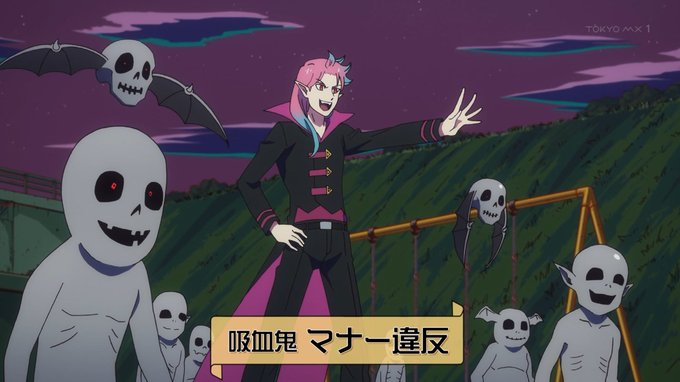
I was able to record this episode with the other cast members, and it was a lot of fun. Basically, the more comedic a role is, the more passion and seriousness you need, so it was a thrilling recording. I had so much fun.
It was so enthralling that I ended up getting too fired up. Etiquette Breacher is kind of a “small fry” character; he says really grand things while doing minor acts of annoyance. During the first test run, I got pretty into it and the director said, “Um, Soma, it kind of sounds like you’re going to destroy the world, so could you scale it down a bit?” *laughs* And I was like, oh, you’re right. *laughs* I was told to have passion but to keep it in check.
Episode 9 was packed with content, and I rewatched it myself too. Every part was really entertaining, and it made me think, “I like this kind of show.” Even back when I received the offer, I thought it sounded interesting. I’m glad that so many people have complimented me on this role.
Well, when I first received the offer, I was told, “You’ve received an offer to guest in a work called Kyuuketsuki Sugu Shinu,” and I said, “Oh, thank you. What kind of role is it?” “You’re an etiquette breacher.” Now, being told that made me think, “Huh? Did I say something wrong just now?” *laughs* Like, was it bad etiquette to ask what the role was? And then I looked at the info and realized it was a character named Etiquette Breacher. That was really funny.
I’m really enjoying this anime as a viewer too, and I think this kind of passionate comedy is a joy to watch. If you haven’t seen it yet, please do check it out.
CHILL CHILL BOX 7th
The next letter is from Nenashii-san. Thank you for writing in.
“Soma-san, staff members, good evening.”
Good evening.
“I attended the afternoon show for the reading drama CHILL CHILL BOX 7th ‘Shoukan IP! ~Shachiku to Vamp~’. It was my first time ever going to a reading drama, and I was amazed by everyone’s incredible acting, expressions, and nervousness from performing live. It was a lot of fun, and it was also really funny when you accidentally said ‘nanbei’ (South America) instead of ‘oubei’ (the West). If there are any behind-the-scenes stories you haven’t talked about yet, please share them with us.”
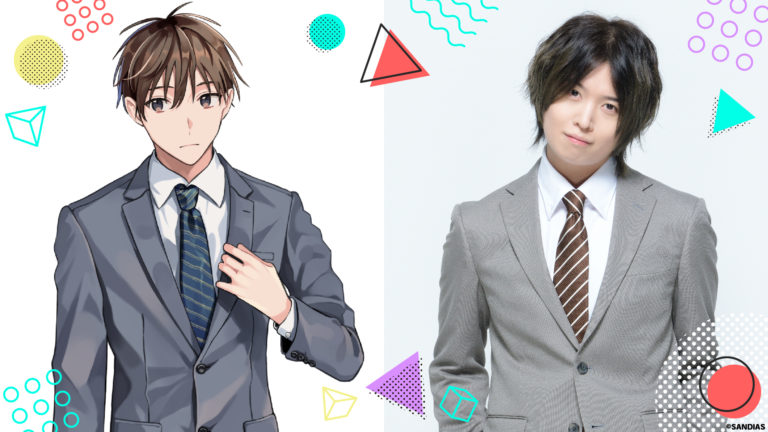
Yes, I participated in this reading drama some time ago. The story was really wacky in a good way, and it even involved a vampire, which made me feel a strange connection to the work.
I was the main character, an office worker who used to be full of hopes and dreams, but after a certain incident, he took on a “don’t rock the boat” mindset. One day, he gets transferred to a new department that summoned a vampire from the demon world, and it’s his job to produce the vampire as an idol. It was quite the exciting premise. That was all I’d heard when I received the initial offer, but I immediately said, “I’ll do it.”
The cast was full of esteemed veterans, and their performances were brilliant. I said this during the talk session too, but I really love both readings and reading dramas. There are so many expressions that you can only do in a live setting. In particular, everyone’s dialogues changed a lot between the afternoon and night shows. Each show had its own highlights, which I think is one of the neat things about live reading dramas.
The summoned vampire was extremely beautiful, and I had a line where I was supposed to say, “He’s like a prince from the West (oubei),” but at the afternoon show, for some reason I brazenly said South America (nanbei) instead. No one could really say anything in that situation, but the atmosphere felt kind of strange. I wondered if everyone was nervous, but apparently I was the most nervous of all *laughs*. I didn’t notice at all, which was why Yoshiki teased me about it during the talk session at the end. Then when it was time for the night show, Inoue Kazuhiko-san who was with me said, “Soma-kun, I’m counting on you to put emphasis on oubei” *laughs*. I took that to heart, and after that, Yoshiki and Nakazawa Masatomo-san continued the ad lib, which I was grateful for. It’s really fun when people follow up on improvisations.
I’ve appeared in many BL works, but I didn’t have much experience with BL-genre reading dramas, so I enjoyed myself a lot, and I’d like to do it again. I don’t get many opportunities to wear suits, so it felt quite fresh. Also, Hatano-san was there too, and he looks really good in glasses, doesn’t he? I think people noticed that I kept glancing at him and thinking, “Ahh, what a beautiful side profile” during the show *laughs*. Yeah, it was definitely during the actual performance.
It really was fun, so I want to thank everyone who came to see it, and I hope I’ll be invited to the next one as well.
Granblue Fantasy
Next, a letter from Tsukapon-san.
“Soma-kun, good evening. I always enjoy listening to your radio. Granblue’s Marionette Stars event was really good. As a long-time Feather fan, I was overcome with emotion because I never thought he’d get so much time in the spotlight. You have a variety of acting styles that you use depending on the character, but Feather is one-of-a-kind. It doesn’t even feel like acting–it really feels like Feather himself is talking. I adore your cheerful–and sometimes insane–performance as Feather, and it gives me a lot of energy. He has a lot of shouting, so it might be quite the burden on your throat, but I want to watch as you and Feather grow stronger together.”
Thank you very much. I’ve been the voice of Feather for quite a long time now, and he’s a top contender for “character who shouts the most” out of everyone I’ve voiced. It’s his unique trait.
The story this time was really good; I won’t say much about it, but please do read it for yourself. It changed my interpretation of Feather a lot, and as Tsukapon-san wrote, he has some “insane” moments. I think you’ll understand exactly what that means if you read the story. It felt like he’d made his breakthrough. It was fun, and as mentioned, it was really hard on my throat *laughs*.
As a general rule, I request to not have any work before or after a Feather recording so that I can expend everything I’ve got on it. Game scripts are split up into “words,” where two lines of dialogue are treated as one “word.” Fifty “words” as Feather are enough to wear out my throat. He’s a cool character, but his shouting isn’t really the “cool” type. I have to shout from my stomach even if it comes out rough, because shouting in a way that’s easy on my throat doesn’t have quite enough oomph. So, every time I voice Feather, I feel like I’m ready to break. I hope that comes across when you hear him.
It really was an incredible story, so if this talk has piqued your interest, please experience it for yourself.
I’m still open to hear what everyone is curious about, so please continue to send in your letters!
Song #2
Now then, it’s time for another song. It’s amazing that this is coming up here, because in a sense, this is a top contender for “Saito Soma’s most ‘insane’ song.” Please listen to Saito Soma’s “Kitchen”.
Closing
♪ carpool
Today’s episode of “Saito Soma Strange dayS” is soon coming to a close. This program is accepting letters from listeners. Any topic is fine, so please send them in to soma@joqr.net.
Now it’s time for announcements. This program has special extra content called “Saito Soma Strange dayS: Fushigi no Tobira”, which is posted on Nizista’s YouTube channel every Saturday. Every week, I talk about a keyword or title that I’m interested in. This content is exclusive to that channel, so please subscribe and enjoy.
As for this program’s broadcast and archive on Abema, the latest episode is updated late-night Thursdays and is available for free for one week. Abema Premium members can listen to the archive all the way from episode 1. Please make use of it if you’d like.
And so, I was finally able to announce my second EP, my beautiful valentine. It’s slated for February 9th. I think the official site and whatnot will be updated after this radio, and there should be more precise information there, so please check that out. I also hope to announce some more things on this radio, so please look forward to that.
With that, see you next time. This has been Saito Soma. Please join me for my curiosities next week as well.
Nakajima Yoshiki replied to this tweet with a heart:
Birthday Wishes 2021
[TV] KBC Asadesu. (2021/3/23, 2021/3/30)
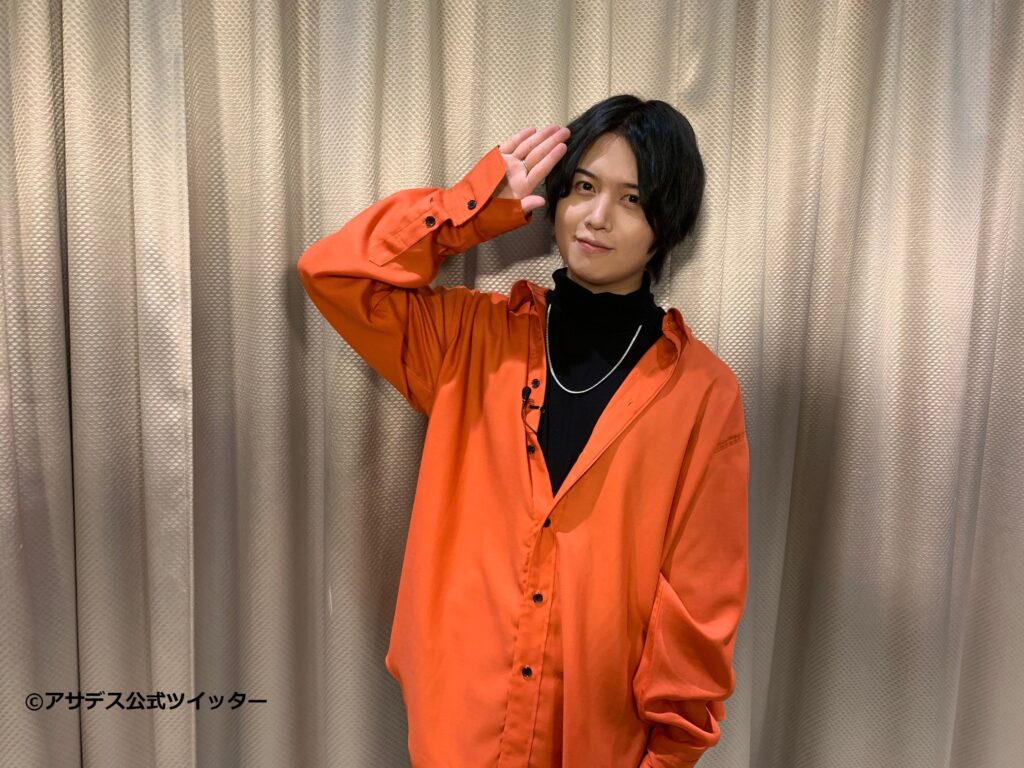
Broadcast: 2021/3/23 (Part 1), 2021/3/30 (Part 2)
Original Name: アサデス。
The second “Asadesu.” interview by Miyata Toshiya from Kis-My-Ft2, an avid seiyuu fan. Soma is the seiyuu he’s supporting the most right now!
Before the interview, there was a short clip of Soma reading a morning call in a princely voice.
Miyata: I interviewed you remotely last September, so this is my first time meeting you in person
Saito: I’d been wondering when I’d be able to meet you, so I’m really happy to be here
Miyata: Out of all the voice actors who are 20-30 years old, I think your voice is the coolest!
(Quick video featuring Saito Soma’s anime roles, Hypmic, and his artist career)
Miyata: I thought your songs were really nice, and then I went “Wait, he wrote all of these himself?” and the moment I thought that, it felt like… the person “Saito Soma” was right there, and I got really into them
Miyata: Also, congratulations on your 1 million YouTube views [on the Date MV]
Saito: *laughs* I think you might be more knowledgeable than I am
(Quick artist career video)
~About why Saito Soma began writing songs~
Saito: When I was a teenager, I was already writing songs as a hobby. I was in a band with my friends. After I became a voice actor, I still wrote songs every now and then even though I wasn’t going to show them to anyone. Then one day, I decided to show my music producer what my songs were like, and he was like “Oh! You write now!”
Miyata: Is he from Johnny’s? Our ex-president? *laughs*
~About “Somami”~
Miyata: I sensed a lot of intelligence from your word choice. What’s your favourite word out of your lyrics?
Saito: I have a song called “Deraciné,” and there’s a phrase in it that goes “kaze ni natte tayutatte itatte iinda.” I like things that can’t be explained in words. So it’s like, “I want to be something that drifts around like the wind.” That’s the first thing that comes to mind right now.
Miyata: I see… You’re so smart that I don’t really understand what you’re saying
*both laugh*
Saito: S-Sorry *laughs*
Miyata: I got through 20 years of Johnny’s with just “Whoa!” and “Really?!”
Miyata: Your tour starts in April, right? And the first stop is in Fukuoka
Saito: I don’t get many opportunities to go to Fukuoka or Kyushu for work, so to be honest, I’m really restless right now. I hope to be able to put on a performance that only the air and atmosphere in Fukuoka can bring out, so please look forward to it. Thank you very much.
~A battle between Miyacchi and Saito Soma in Old Maid~
Miyata: An Old Maid game where you can learn Fukuoka lingo!
*both clap*
Miyata: Since you’re coming to Fukuoka in April for the start of your live tour, we prepared this so that you can learn Fukuoka words and locations to use in your MC.
Saito: That’s so nice of you! Thank you!
Miyata: The rules are standard, but instead of pictures, the cards have Fukuoka phrases on them (in Hakata-ben and whatnot). When we get a pair we can discard it, but we have to read out the phrase in a cool voice. If you win, then 20 seconds of your MV will be aired. If I win, then 5 seconds of your MV will be aired.
Saito: So I essentially win either way?
Miyata: Yeah
Saito: That’s so kind of you
Miyata: Kis-My-Ft2 doesn’t get to be aired?! Come on, air us too!!
(MV of Kis-My-Ft2 – Luv Bias)
Miyacchi shuffles the cards – which have a Yu-Gi-Oh-esque back
Miyata: This brings me back to my childhood
Saito: It makes you remember, right?
Miyata: I wanted Blue Eyes
Soma finds a pair in his starting hand…
Saito: Um, I’d rather have this said to me
Miyata: Oh?
Saito: Nee nee… sono seki… totto-to? (Hey… is that seat… available?)
Miyata: Cute!!!
Miyacchi also has a pair in his starting hand
Miyata: I’ve got a tough one here… Chikugo-Funagoya ni wa… Tamasuta (Chikugo-Funagoya has Tomahawk Stadium) *laughs*
Saito: That was cool
Miyata: Really? Thank you
Saito: It was an ikemen voice!
Miyata: Thanks. Oh man… the person with the coolest voice said I have an ikemen voice
The game begins
Saito: ORE NO TURN! DRAW!
He draws the old maid
Miyata: DRAW!
Miyata: Oh, a pair! *angry voice* Kosuka~!! …Sorry, what does this mean?
*Soma laughs*
Miyata: Oh, “unfair”! So the way I said it wasn’t necessarily wrong, good
Saito: Boku no turn… DRAW!
Saito: *drew a pair* I want this to be said to me…!! Naa… bari sukicchan (Hey… I really like you)
Miyata: So cool! *in tears* That’s… the voice I always hear in anime… *wiping tears* I always hear this voice…
Saito: Um, this program is called “Asa desu” (“it’s morning”) but now I’m “Ase desu” (“I’m sweating”)
*both laugh*
Miyacchi draws a card
Miyata: A pair! Chihaya-eki no tsugi wa~ Kashii-eki ya ne (The next stop after Chihaya Station is Kashii Station) …I feel like TOKIO’s leader now
*both laugh*
Saito: Kashii Station and Chihaya Station?
Miyata: Apparently Kashii Station has a lot of students, so the students might be happy if you know about it
Saito: Ohh, I see
Saito: Watashi no turn… Draw.
Saito: *drew a pair but seems to be confused*
Saito: *old man voice* Ah… Zasshonokuma de… mattorubai! (I’m waiting at Zasshonokuma (name of a building))
Miyata: Wow! That was lifelike! I could visualize the scene!
Miyacchi has one card left, Soma has two including the old maid
Miyata: I’ll win this, and Soma’s MV will play for 5 seconds! DRAW!
He draws the old maid
Saito: I choose you!
He draws the old maid
Miyacchi draws the old maid again
Miyata: The face on this card is starting to annoy me
Saito: It’s like it’s mocking you, right?
Saito: Watashi no turn… Draw!
Saito: *drew the final pair*
Saito: *whispering voice* Nanshiyotto? (What are you up to?)
Miyata: Cute!!!
Miyata: Okay then, it’s Soma-kun’s victory!
*both clap*
Saito: Thank you
Miyata: It’s my loss. Please play the MV!
Saito: Please watch this MV of a song I wrote~
(carpool MV plays)
Saito: I’m glad that I got to be on such a warm, friendly program, thank you! I’m really happy *bows*
*they do the Asadesu pose together*
[Serialization] Monthly TV Guide 2021/4 Edition – Saito Soma no “Tsukurikata”. 02
(no scans because it’s still a recent release)
Released: 2021/2/24
Features:
Saito Soma
Nakao Ryusei
※Part 2 of the discussion with Nakao Ryusei.
Saito Soma and his respected former teacher discuss “Voice Actor Training School” (Part 2)
—Why did Nakao-san start teaching at a training school?
Nakao: I actually didn’t want to be a teacher *laughs*. At first, it was a study group. They told me to “look after the youngsters” and I thought, “I’m not old enough to be doing that!” I was just under 30 at the time.
Saito: I’m 29, so for you to be asked that at around this age… Wow!
Nakao: The number of people in the study group grew, and they decided to turn it into a proper training school. In the early days, I’d even get questions like, “I have an audition tomorrow; how should I read this?”…
Saito: Whoa!
Nakao: I learned acting through self-study, so it was embarrassing to be called “Sensei,” to the point where I felt bad about it. But I think that when you’re teaching people something, it shouldn’t be what you digested and applied for yourself. When I became a lecturer, I started reading books about acting. The content was complicated, but I realized that it was all things I’d already been doing.
Saito: That’s amazing.
Nakao: The best part was studying with trainees who had much better sensibilities than me. It was stimulating and educational because we had completely different perspectives.
—In the past, voice acting training schools didn’t exist to begin with, after all.
Nakao: Yes, in a way, it’s good to be taught. But things that are simply taught are also simply forgotten. Besides, nowadays you can easily look up answers on your phone, although whether that’s a good thing or a bad thing depends on the person. Back in my day, we would go all the way to the National Diet Library to research things. No one would teach us, so we often embarrassed ourselves at work. At training school, we teach various things so that students can avoid that situation, but in the end, you learn more from actually doing the job.
Saito: Without experience, you slip up. Even if you know in your head what to do, it doesn’t manifest at the recording unless you’ve fully grasped it.
Nakao: In these thirty-plus years, 81 Produce’s training school went from a three-year format to two, then one. Instead of leisurely studying the art, people want to become an immediate asset. The trainees are so serious that I wish I could tell them that they don’t have to stress so much about it. After all, I didn’t take acting that seriously in my life.
Saito: In my class, there were a lot of people who were truly amazing, and I was grateful to be able to study with them. Their personalities were diverse, but I think a lot of them were hungry for knowledge and progression.
Nakao: Your class really was diverse.
Saito: At the time, I was the type to think through everything, so I was extremely scared of making mistakes.
Nakao: There are people like you, and there are people who don’t plan anything. With the latter, I enjoy seeing what they’ll show in the future. There’s no correct answer, after all.
Saito: Thinking about it now, back then I was overly complacent with my knowledge and assumptions.
Nakao: You were quick to evolve when you were told to do a retake. Conversely, it means that you were too serious. At times like that, seniors tend to say “Go wild with it!”, but then it becomes, “What’s that supposed to mean?”
Saito: I really wondered that *laughs*. Actually, I probably still don’t know for sure what it means…
Nakao: They’re just trying to say, “Don’t conform to the norm.” The idea is that if you’re given the number “10” and you give a compact formula like “5 x 2”, they’re telling you to instead answer with something like “10000 – 9990.” But that way of thinking isn’t really something you can just do. In fact, people who always give answers like that get told, “Come up with a normal formula!” *laughs*
Saito: Since people start with their own values as the baseline, everyone has unique traits. But Nakao-san, you give off the impression that you’ll accept any approach people take.
Nakao: That’s the only way we can phrase it. But I knew that everyone in your class was thinking deeply in their own ways, so I didn’t say much. The only thing we can teach you is formulaic approaches. We just want you to be more versatile.
Saito: I don’t think the focus of the lessons was on techniques—you taught us more fundamental things. It felt like you were saying, “If that’s the method you choose, then explore it thoroughly.” There’s logical thinking vs. acting through feeling, and you didn’t guide us towards one approach over the other. I’m really thankful for that now. At training school, I got stuck a lot while thinking things through, but before long, I started thinking, “Dialogues are really fun!” I feel like I’m leaning more towards the “feeling” side as the years go by. As I walk the path of an actor, the way I perceive the world continues to change. At training school, I learned how to get started with the fascination of voice acting.
Nakao: I’m glad to hear that. It’s just that it’s hard for trainees to think of it that way, because everyone is in a rush to become pros. Knowing that, I say these things in hope that the meaning will reach them someday in the future. I also teach them, “It’s okay if you don’t have a sense for it.” If you don’t, then you can succeed by being aware of the fact that you don’t.
Saito: You also said, “There’s nothing you can do about how nice everyone else’s voices are.”
Nakao: Even a weird voice like mine is fine, after all.
Saito: What are you saying *laughs*. You taught us that it’s good to look at things from different angles and perspectives.
—Can the teachers tell which trainees are improving?
Nakao: We don’t expect them to be skilled when they’re still in training school, but as we’re teaching, we can sense which ones are probably going to be ready to work soon.
Saito: How can you tell?
Nakao: It’s their acting spirit—whether they’re geared towards acting and creating as a group. With animation dubbing, once you’ve done it three times, you can match up with anyone. So the people who move on to become voice actors are those who can do the acting properly.
Saito: The way I think of it is that when you’re performing a dialogue, it feels like your brains are connected.
Nakao: It’s like playing catch.
Saito: For me, what’s important when acting is essentially the “conversation” aspect, with the other actors, the story, and myself. It’s exactly like how we’re talking right now. Instead of deciding everything in advance, taking in what’s said and reacting to it. It’s something you do without thinking, but actors who really enjoy it have radiant acting that draws you in.
Nakao: I think everyone has desires, like wanting to be famous or make money. But there are a lot of things you can accomplish even if you don’t achieve those. Just because you aren’t famous or you don’t make a lot of money doesn’t mean you aren’t a good actor. Although, I can only say this because of my age—young people might not be able to think this way. When I was your age, Soma, I was hopelessly cocky. And I thought, “Will I be able to do better acting when I’m 30?”…
Saito: …I also vaguely assumed that something will change when I turn 30. *laughs*
Nakao: When I turned 30, I thought, “I guess it’s not enough, maybe it has to be 40.” When I turned 50, I thought, “Hmm, maybe it’s 60.” This year I finally turned 70, and all I can think is, “Huh, I always sucked.” But even though I sucked, I still made it this far. When I was young, I was obsessed with getting better.
Saito: Being reckless in your own way, thinking, “I think I just grasped something,” only to become unsure the next moment…
Nakao: It’s an endless repeat of that process.
Saito: Even though I didn’t fully understand what I was taught at training school at the time, as I’m working, there are times when I realize, “So this is what they meant.” One example is your story about the time when you were busy with both work and personal matters. You were standing in front of the mic, and once you thought, “This isn’t the right state of mind for acting,” you were easily able to give a good performance. I also had a time when I got stuck because I was thinking too hard, and I thought, “I don’t get it! I’m going to clear away the jumbled mess in my mind for a second!”, and it felt like my field of vision opened up a bit. I immediately understood what you told us back then.
Nakao: The hardest thing for rookie voice actors to learn on the job is mic work (switching in and out with other voice actors due to the limited number of mics). Right now, due to COVID-19, everyone has their own mic… but I think rookies will have a hard time with it when the pandemic is over.
Saito: Even I’m not sure if I’ll be able to do it anymore…
Nakao: You’ll be just fine *laughs*. A long time ago, a rookie voice actor was gently instructed by his senior, “Come over here.” The rookie answered, “I’m fine right here,” and the senior scolded him, “If you stay there, the mic rotation won’t work!” Rookies should listen to what their seniors say.
Saito: Speaking of what happens at the studio, there’s one thing I want to tell you here, Ryusei-san.
Nakao: What is it? *laughs*
Saito: You taught us that, “At the studio, rookies sit close to the door and open/close it during breaks,” and I put that into practice. Then, much later, when I had the opportunity to work with you again, I was all motivated to sit next to the door… but when I arrived, you were already sitting in the chair closest to the door.
Nakao: I’m really sorry *laughs*. I’ve always been timid, so I feel the most relaxed next to the door. And I get scolded by the rookies, who say, “There’s nowhere for us to sit now.”
Saito: It made me anxious, like “Huh?!” *laughs* I’m obviously joking, but I really do feel nervous when we’re at the same recording. But like you said at training school, “If we meet at the recording studio…”
Nakao: “We’re already fellow actors.”
Saito: When I greeted you, you said, “Oh, we got to meet at work!” I was happy that you remembered me.
Nakao: I’m glad to run into trainees at work. But I’m the most nervous of all—I don’t want them to think, “What? He’s nothing special after all.”
Saito: We absolutely won’t think that!
—Please give some advice for those who want to become voice actors.
Saito: I’m in no position to be giving advice, but…
Nakao: Nowadays, people are joining the training school because they want to be like you! Don’t run away. *laughs*
Saito: Sorry *laughs*. It reminds me of when I was a teenager. I was extremely cynical back then. I couldn’t really play with everyone at school festivals or hang out after school. I think that’s one of the reasons why I’m addicted to voice acting now. I can go back to being a high schooler over and over.
Nakao: I see. *laughs*
Saito: My humble opinion is that it’s definitely better to be honest and enjoy yourself right now.
Nakao: I completely agree.
Saito: The world is in a tough place right now, so I can’t say anything irresponsible, but I believe that everything you feel and experience right now in this moment will become your assets. For me, it hurts to remember my cynical days, but when I encounter a character like that, I can make use of my experiences.
Nakao: Fully take in what you’re feeling right now and enjoy the present. It’ll benefit you in the future no matter what your profession is.
Saito: Lastly, I have a brazen request… I want to do a reading with you, Ryusei-san.
Nakao: Of course! I’ve been telling everyone, “Play the main role, and invite me as a guest.” If I can appear once on everyone’s programs, I’ll have a peaceful life in old age. *laughs*
Saito: Wow! *laughs* I’ll strive towards being able to work with you again! Thank you very much for today.
[Serialization] Monthly TV Guide 2021/3 Edition – Saito Soma no “Tsukurikata”. 01
(no scans because it’s still a recent release)
Released: 2021/1/22
Features:
Saito Soma
Nakao Ryusei
Mentioned:
Komada Wataru
Ueda Reina
Takahashi Rie
Saito Soma’s new serialization where he discusses “How It’s Made” with anime industry professionals. The first guest is Nakao Ryusei, who was Saito’s teacher at voice actor training school. Nakao was born in 1951 and debuted at the age of 5 on a radio drama. He discovered the industry in an era where “voice acting was an actor’s part-time job.” He became known for roles such as Baikinman in Anpanman and Frieza in Dragon Ball Z, and in 1985, he got involved in training the next generation at the previous iteration of 81 Produce’s training school. When Saito enrolled there, Nakao considered him “already skilled” from the very beginning. Here, they discuss what a training school teacher does and what the place means to voice actors.
Saito Soma and his respected former teacher discuss “Voice Actor Training School” (Part 1)
Saito: I went to training school more than ten years ago. There are a lot of things that I don’t remember very well, but I do still remember what happened there. For example, going to a summer festival with all of my classmates, like Komada (Wataru)-kun, Ueda (Reina)-san, and Takahashi Rie-chan. I think there were a lot of unique people in our year.
Nakao: It was a fun class with a lot of motivated people.
Saito: I feel like we also caused a lot of trouble *laughs*. I think there were a lot of really ambitious people. After class, we would always discuss what we learned that day in front of the train station.
Nakao: Wow!
Saito: I really enjoyed the debates we had. It was truly a time of adolescence, struggling and frustration included.
Nakao: 81 Produce’s training school curriculum used to be three years. You went there for one year, right? In the first semester you studied voice fundamentals and readings, the second semester was animation voicing, and the third semester was dubbing Western films. But now, animation voicing is done in the first semester.
Saito: Right off the bat?!
Nakao: Anime dialogue is caricaturized to begin with. Before you can study realistic dialogue and acting, you have to do caricaturized acting. There are also classes for fundamentals, speaking, and narration, but it’s still rather tough.
Saito: That’s demanding.
Nakao: The “Words” class that I teach is taught by two teachers in two time blocks. One teaches fundamentals while the other is for practical application like anime dubbing. We take turns teaching the blocks.
Saito: So, Ryusei-san taught me both fundamentals and practical application. We did the “Uirou-uri” (a type of kabuki prologue used for practicing articulation and enunciation) too, right? What I remember most from the lessons is “Wasshoi” which used the lyrics from Kitahara Hakushuu’s Omatsuri.
Nakao: We still do that now.
Saito: The line “Wasshoi, wasshoi. It’s a festival, it’s a festival!” would be repeated, and the following lines would be different things like “A hanagasa on our backs~” or “A portable shrine; it’s a portable shrine~”. We would all stand in a circle and recite the verses from memory. The person speaking goes in the middle of the circle, and when they’re done, they pick a random person to go next. So, you don’t know which part you’ll be reciting until the time comes…
Nakao: You pass the baton while keeping the rhythm.
Saito: We keep going until we make it to the end without making mistakes or breaking the rhythm. It was extremely nerve-racking voice training.
Nakao: The day’s lesson wouldn’t begin until they did it perfectly. It’s a type of theatre game (practice for developing acting ability). Even though you memorized the song, you might blank out when the time comes to say your part.
Saito: Exactly.
Nakao: It’s even more stressful for the last person. If they make a mistake, everyone has to start over from the beginning.
Saito: The pressure builds as the song progresses.
Nakao: It also acts as mental training. At an audition, “I really do have it memorized” doesn’t fly. You have to do it right then and there. We also teach the students to look at people’s eyes when choosing the next person, because you’ll be able to tell if they remember the next line or not.
Saito: You can sense if they’re sending the “I can do this one” signal.
Nakao: Then you can also tell if they’ve memorized the entire song or if they only know one part. However, that’s not always going to work either, so what do you do? We have them work on a solution together.
Saito: You have to think about multiple things at the same time. It’s like that when voice acting too.
Nakao: The workplace is no different.
Saito: If you told me to do “Wasshoi” right now, I think I’d say “Please give me a break.” *laughs*
Nakao: Then, the final part of training school is the presentation.
Saito: Each class presents a work that’ll be the culmination of what they learned that year.
Nakao: We want everyone to come together to create a single work. Even though they aren’t “eating out of the same pot,” we want them to have that foundation. It’s also on them to find a place to practice.
Saito: For our independent practice, everyone pooled money and looked for a place we could rent. Also, each class had their specialties—for example, if they had someone who was good at making arrangements, they would get a training place booked in a flash.
Nakao: The duties naturally get distributed.
Saito: The world of acting involves working together to create something, which comes with both enjoyment and difficulties. We learned about that at training school too.
Nakao: We teachers are like driving school teachers. We can drive with one hand spinning the steering wheel, but we have to teach the students fundamental driving techniques like holding onto the wheel firmly with both hands.
Saito: What I appreciated the most at training school was that on top of teaching us the basic mentalities and techniques, they also made us think for ourselves. Instead of saying, “Do it like this,” they asked questions like, “How did that feel?” or “How do you want to do this?” I’m the kind of person that likes to think. Conversely, that means I tend to be satisfied with small successes. Also, at first I had a strong desire to not make mistakes, but Ryusei-san told me, “This place exists for you to make mistakes.” He never once scolded us unfairly either.
Nakao: I did scold people.
Saito: Aren’t scolding and admonishing completely different? I consider what you did “admonishing.” When you admonished us, we really did deserve it.
Nakao: I never admonished you alone, right? But I did admonish the class as a whole.
Saito: There was a time when we got too used to your kindness.
Nakao: It wasn’t my kindness—since we always studied from the same materials, you got used to the course content. When people become competent to a degree, they let their guard down. That’s when I scolded them and said, “Don’t get used to it!”
Saito: Ryusei-san is usually really nice, but when he says, “Tighten up this part and try again with firm emotion,” it’s sharp and motivates you.
Nakao: Saying it sharply makes them perform sharply, right? And then I scold them again, saying “Why didn’t you do it before I had to tell you to?!” I just don’t like it when they can do it but they don’t. If they can’t do it, then that’s a different story. But being capable yet choosing not to do it is bad. I get a little angry when that happens.
Saito: The sound pressure went “bang!” that time. I thought, “So this is what it means to have a voice resonate through your body!” That was when I experienced a real professional’s vocal force directly instead of through a mic.
Nakao: I’m always practicing for that purpose *laughs*. If you wait until you’re told to do it, it’s too late. When you become a professional, you have to do it properly from the start.
Saito: When we first started training school, our mindset was “first, be taught.” From there, we switched gears to assembling our own performances and acclimating our bodies to those ideas. Come to think of it, I expected the “Uirou-uri” story to come up today, so I reviewed it and was astounded. I thought I’d analyzed the content and its meaning back then, but when I read it now, it’s like seeing it through a higher resolution lens. I thought I understood it back then, but my perspective was too narrow.
Nakao: “Uirou-uri” has a lot of components. Accents, nasal sounds, devoicing…
Saito: Back then, I was really focused on memorizing it properly. “Uirou-uri” is about using any means possible to sell the audience on an amazing medicine. When I reviewed it, I kept thinking about how I’d want to present it. But if I did it right now, I think it’d sound extremely shady. *laughs*
Nakao: That’s brilliant. *laughs*
Saito: Since being taught by you, I’ve come to like more things. Back then, I was in my third year of university. That year, I decided that I would dedicate my whole life to walking the path of voice acting.
Nakao: Really?
Saito: I didn’t think my personality was suited for being a voice actor because I didn’t think I could take a step forward with sensitiveness or explosiveness. That was all I thought about every day. One day, I was eating in the school cafeteria, and I suddenly thought, “Wait—if my personality isn’t suited for it, does that mean that if I keep doing voice acting work for my whole life, I’ll be able to change myself over the course of my lifetime?” I called my parents right then and there and told them, “I’m not going to go job hunting.”
Nakao: So that’s when you decided.
Saito: Both of my parents are enthusiastic teachers. They said, “It’s your own life. We’re happy that you discovered what you want to do.”
Nakao: That’s kind of them.
Saito: They also said, “But since it’s your life, be responsible for it yourself.”
Nakao: I’m definitely never meeting your parents! They’d probably say, “Was it you who tricked our son?!” *laughs*
Saito: No way *laughs*. I talk to my parents about what you taught me.
Nakao: They sound like good parents. When you were taking my classes, you were always worrying.
Saito: A lot.
Nakao: And now you’re shining. You were a bit dark when you were worrying.
Saito: *laughs* Yeah.
Nakao: At the time, I thought, “He’s the type to overthink, huh?” It was a worrying time period for you.
Saito: Back then, I was intentionally narrowing my field of vision. All I thought was, “I need to show good results here so that it’ll lead to the next step!” I think that that in itself was a necessary time for me.
Nakao: What we teach at training school isn’t that grandiose, right? The first thing we talk about is always your mentality and the “wait” attitude.
Saito: Right. At training school, rather than how to be an actor, I learned a lot more about the fundamental mentality that I should have as a person who’ll be entering society.
Nakao: Our job is to wait. We have to wait until work comes. How do you spend your time waiting? “Lessons are important, but how are you going to live your life until our next class?” Since the classes continue for a year, I want the students to wait effectively. After they become professionals, this will stick with them for the rest of their lives.
Saito: Even now when I meet people from that class, we often talk about the “wait” attitude.
Nakao: Everyone’s working as hard as they can, right? Because they’re pros. But what do you do when you don’t have work? This becomes the most important thing. Waiting effectively, concentrating effectively, and putting forth your best effort. Also, don’t slack off during lessons!
Saito: I think that 2020 in particular was a time for the whole world, not just actors, to think about “waiting.”
Nakao: Everyone, yes.
Saito: I try to keep the wait attitude, but sometimes I give in and I’m just waiting, or I become too passive. We voice actors only exist because of creative works and characters, but that said, we should also be able to actively create and express something. I thought a lot about how it’s important to “wait actively.” I can’t practice in a really loud voice at home, after all. *laughs*
Nakao: I’ve been working for many years too, and this is the first time I’ve had so much time to myself. At times like this, your mentality is the most important thing. We’ve been living rather brazenly, but the young people who are starting out in their career have weaknesses in their mentality. How will they fortify those and wait until their next opportunity? It might be a good idea to think about that.
(Continued in Part 2 in Monthly TV Guide 2021/4)
Bonus
- Soma talks more about the “wait” attitude he learned from Nakao in this interview with Livedoor News.
- Video messages promoting this new serialization:
(*He says 1/24 in the video, but the actual release date was 1/22.)
[Interview] Aoi Haru no Oto ga Kikoeru Vol.4 – Cast Interview
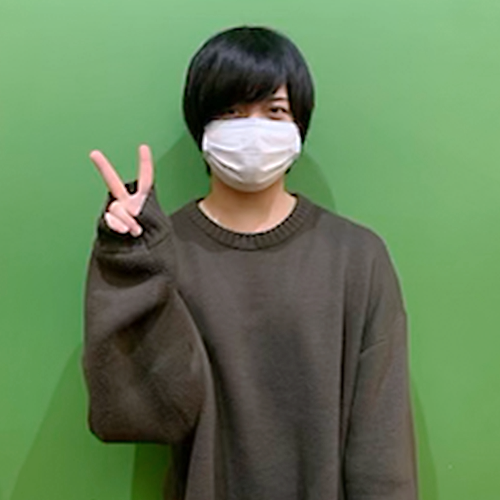
Original URL: http://www.team-e.co.jp/spica/aoharu/special.html#vol4_03
Published: 2021/1/14
※Only Soma’s interview has been translated in this post.
Q: Please tell us your impressions of the story after reading the Vol.4 script.
I thought it was a really great story. I cried several times while checking the script. This volume depicts the aftermath for each character, and I think that Iriya’s story became a major key. I was truly glad that he met Nao and the others. The direction also leveraged the advantages of the medium. I think that this work could only exist as a drama CD. I’m looking forward to listening to the final product.
Q: Please tell us your impressions of the recording (what you felt was difficult or enjoyable about voicing your character).
My biggest concern was simply what was going to become of Iriya, so I was really relieved that his story reached a breakpoint and continued on. There were many memorable parts, but the biggest one has to be the conversation with Nao. We unfortunately couldn’t record it together, but Nao’s lines were recorded first, and I listened to his honest, passionate feelings as I performed mine. Then there was the conversation with Takaomi-san where Iriya could finally take a half step forward, and the touching graduation ceremony. Throughout the entire volume, instead of using a logical approach, I embraced Iriya’s bared feelings and acted to the best of my ability.
Q: The theme of Vol.4 was “each of their futures.” What did you think about the final development?
I teared up at how each character either had their dream granted or found their dream, and now they’re doing their best on their own paths. Personally, while I was surprised at what happened with Ayato and Ibuki with their dreams, I was even more surprised at Ren, and it was really satisfying *laughs*. High school is only a brief moment of their long lives, but being able to spend that irreplaceable time together is their greatest fortune.
Q: Which character left the biggest impression on you in Vol.4?
Since I read the story from Iriya’s perspective, he naturally leaves an impression on me, but… it has to be Ren *laughs*. I thought, “This is unfair!” in a good way. Due to various circumstances, we couldn’t record as a full group for this series, so I wish I could’ve had more in-person dialogues with the others. Since the latter half had especially heavy plot developments, I wish we could’ve had more fun together during the everyday life parts…!
Q: Please give us a message for the fans enjoying Aoharu.
Thank you again for supporting Aoharu up until now. I’m not going to say much here; instead I just hope you’ll immerse yourself in the world of this wonderful series. Personally, I was very happy to experience this sparkling yet painful, vivid adolescence with the boys. To be honest, I don’t want to graduate from this series…! Someday, somewhere, I hope I’ll be able to meet everyone again. Thank you for listening to Vol.4!
[Interview] Aoi Haru no Oto ga Kikoeru Vol.3 – Cast Interview
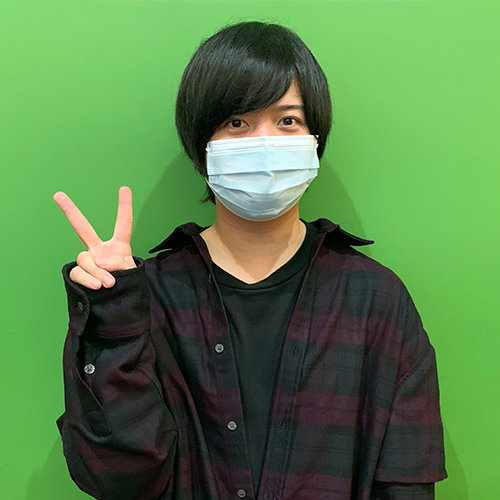
Original URL: http://www.team-e.co.jp/spica/aoharu/special.html#vol3_03
Published: 2020/12/29
※Only Soma’s interview has been translated in this post.
Q: Thank you for your hard work today at the recording. Could you tell us your impressions of the story after reading the Vol.3 script?
I thought it was an incredibly dense volume. Last time I was glad that Nao and Ayato’s problem got resolved, but this time the scenes moved dizzyingly fast, from Ibuki and Ren’s part in the first half to Iriya’s part in the second half. The turbulent pacing was fitting for the turning point of the story.
Q: Please tell us your impressions of the recording (what you felt was difficult or enjoyable about voicing your character).
Iriya had rather fierce emotional ups and downs this time, and it was hard to not let each of the scenes influence each other. For example, chronologically, the scene at the end takes place at the time of Vol.1. At any rate, I acted each scene to the best of my ability. Iriya and Takaomi’s disagreement is still deeply ingrained. The comedic scene where everyone’s having a strategic meeting at Nao’s house is the source of comfort this time.
Q: What did you think of the themes of “You can go to the future, but not the past” and “Making a choice you won’t regret” in Vol.3? And what did you think of Ibuki and Ren, the key characters in the first half?
Their struggles are very realistic. Having a dream but also wanting to consider your parents’ will; not being able to find your dream in the first place… I think it’s great that they’re supporting each other through those true-to-life worries. In the scene where Ren pleads with Ibuki’s father, I felt that Takeuchi-kun poured his soul into it rather than using careful technique.
Q: Which character left the biggest impression on you in Vol.3?
I think it’d be Iriya. Ren and Ibuki were notable too, but I’d always been wondering what happened on that night. I’m curious about what will happen to Iriya in the last volume and whether there’ll be solace for him, since it ended the way it did… I hope that that radiant smile will return to Nao.
Q: Please give us a message for the fans based on the story highlight of this volume.
Thank you for supporting Aoharu! What did you think of the volatile plot developments this time? The cast members are also excited to find out how the boys’ story will end. Please stick with us until the last volume and hear for yourself too. Thank you for your continued support!
Extra:
In Uemura Yuto’s photo from the recording, he was wearing the beret that Soma gave him from the glamb collab:
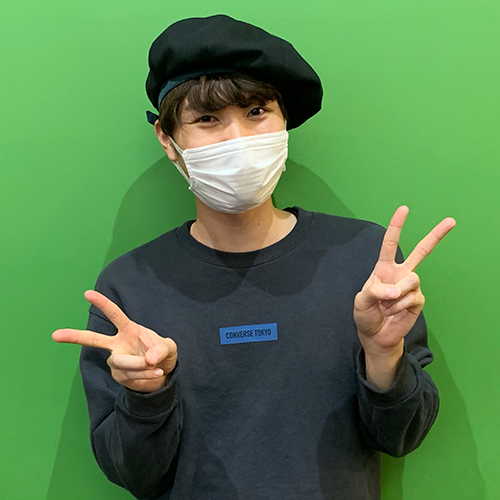
[Interview] Oricon News – Hypnosis Mic Division Variety Battle @ABEMA #4: Fling Posse – Cast Interview
Published: 2020/12/29
Original URL: https://www.oricon.co.jp/news/2180697/full/
Features:
Shirai Yusuke (Amemura Ramuda in Hypnosis Mic)
Saito Soma (Yumeno Gentaro in Hypnosis Mic)
Nozuyama Yukihiro (Arisugawa Dice in Hypnosis Mic)
New frontiers? The handbells were surprisingly responsive. “At the next concert…” “It’d be too surreal”
—We saw a new side of the three of you. What was it like doing a variety show together?
Saito: I thought that the other two were really dependable. Everyone hyped up the show in their own way, and I reaffirmed the trust between us. I really felt grateful to be able to be in a team with them.
Nozuyama: When I’m with these two, I feel safe and can give it my all. Since it was a variety show, there were a lot of on-the-fly aspects, and I think it went well because we’re on the same wavelength.
Shirai: I trust Soma and Nozu, and I can rely on them. Whenever I say something weird or mess up, they cover for me. I feel safe leaving myself in their hands. That’s why I could have fun and be at ease even in a variety show. I want to keep having fun and excitement while depending on these two.
—It’s great how you trust each other and work together. This time the variety games were Christmas-themed. Was there anything in particular that was memorable or clicked with you?
Nozuyama: I think for me, it’d be the “Christmas Three Hint Challenge” where two people are blindfolded and the remaining person gives hints for them to guess the word. I thought it was amazing how Soma-san only had to give one hint for Shirai-san to guess right. I felt their bond.
Shirai: No, that was a three-person effort. But since we got them right too quickly, I didn’t have a turn as the hint-giver. I considered it a mistake.
—Even though your deep bonds led you to the right answer, you regret it from a composition perspective…
Nozuyama: Also, I was surprised we could get that far in the “Handbell Challenge” even though it was our first time. It makes me wonder if we can have a “Shibuya’s Handbell Corner” at the next Hypmic concert. Well, I don’t think it’ll ever happen. *laughs*
Saito: It fits Shibuya’s character, but it’d be too surreal. *laughs*
Shirai: Besides, our next concert is the battle against Yokohama. Why would we ring handbells there? *laughs*
—It’d be quite innovative, so I’d like to see it. Is there anything from this program that you thought someone did particularly well?
Saito: Both of them were dependable and funny, but I think it was Shirai-kun who provided the unexpected surprises. Having Shirai-kun in the middle makes for a good balance. I feel secure and it makes it really easy on us.
Nozuyama: Right. Basically, Shirai-san is leading us along.
—Both of you have high praise for Shirai-san. Shirai-san, what do you think of Saito-san and Nozuyama-san?
Shirai: Both of them have their own strengths. Nozu has fearless courage, freshness, and energy. Soma provides appropriate quips and comments in between maintaining his character. I think we showed what only this team is capable of being.
The Shibuya episodes in the anime where we can see glimpses of the characters’ unexpected faces
—In Episode 5 of the anime Hypnosis Mic -Division Rap Battle- Rhyme Anima, there was a memorable scene where Gentaro and Dice are messing around with the adorable Ramuda. What was it like acting it out?
Shirai: At the recording, I asked if Ramuda was truly scared of ghosts, and was told yes. So, I was glad that we got to see another new side of him. There were a lot of reactions from the viewers too. I think it’s great that we get to see a lot of new sides in the anime, not just of Ramuda. Although there were also parts that were tough because of all the screaming *laughs*. I remember it being a fun recording.
—The character interactions show how vast the backbone of the series is, making for deeper appeal.
Saito: I think that might be especially true for Shibuya. Instead of having a specific person always progressing the conversations, in Episode 5 it’s Gentaro that shows interest in the ghost hunt, and in Episode 8 it’s Dice saying his usual things. The perspective changes depending on the central character of the episode. I felt that Episode 5 really showed the Posse’s complex, pop aesthetic which becomes like a marble texture. I thought it was great how you can feel Dice and Ramuda’s different types of cuteness more strongly.
Nozuyama: What surprised me is that because COVID-19 delayed the recording period, Episode 5 ended up airing on Halloween. Normally it would’ve been better if that situation didn’t happen, but since it happened to be that day, does that mean that Dice’s luck worked?
Shirai: Even though it normally never does. *laughs*
Nozuyama: Maybe that’s why this time it did. I think the fans would’ve had more fun watching that story on Halloween too. The director told me it wasn’t on purpose, so the fact that it naturally ended up in a good place felt like one of Shibuya’s miracles.
—What a quirk of fate. What did you feel was Fling Posse’s charm in the anime?
Nozuyama: Shibuya is the “beautiful girl” type. Ramuda is cute, Gentaro is beautiful, and Dice is a bit sexy. Their charms were doubled in the anime. Ramuda moves around a lot, Dice has fierce emotions, and Gentaro sidesteps them with a nonchalant air. We expressed these things in the drama tracks too, but having visuals makes them flashy and colourful. I think it shows what makes Shibuya them.
Saito: All of the characters are cute, but among them, Shibuya gives off the most cheerful, casual impression. Despite that, they’re eccentric and their conversations aren’t always bright and happy, and I think that side of them is appealing as well. Each division has its quirks, and in Shibuya’s case, I think that one of their merits is the cheerfulness that stems from having Ramuda as a leader.
Shirai: Even when the other divisions are having serious clashes, Shibuya is fairly laid-back. Despite that, they also have a bit of darkness to them, and they maintain a reasonably distanced relationship. The anime condenses that, so we get to see a lot of different faces from them, including a unexpectedly passionate one.
Using their deepened bonds as a weapon… Their pledge to advance in battle in 2021
—In March of this year, “Hypnosis Mic -Division Rap Battle- 5th LIVE@Saitama 《SIX SHOTS TO THE DOME》”, which was supposed to be held at Saitama’s MetLife Dome, was suspended due to the COVID-19 pandemic and became a live stream instead. However, the other day, it was announced that all six divisions will be performing together next year on August 7 and 8. It’s still a ways off, but how do you feel about the “revenge concert”?
Shirai: I want to do something colourful and flashy, that only Shibuya would do. I guess for “Stella” it’d have to be wire stunts. Oh… but Soma is afraid of heights *laughs*. It might also be nice to enter with coloured smoke like in tokusatsu.
Saito: I’ll be watching you two sadly from the ground all alone. *laughs*
Nozuyama: Wait, it’s rap, you know? It’d be weird for us two to be flying around. There’s no way we’d do it *laughs*. The anime has flashy things like explosions, so I think it would be more immersive for the audience if there were special effects like the stage exploding after a song. What do you think?
Saito: It could be possible with projection mapping. I also like the idea of music visualizations flying around according to our hand gestures.
Shirai: It’d take a lot of practice, but it sounds interesting… Our dreams are vast, but we don’t actually know what we’re going to do yet, including the set list. That’s why we’re excited about putting it together. I want to show the audience a powered up performance.
—After hearing these ideas, I’m looking forward to seeing what kind of performance and effects you’ll fascinate us with. Lastly, please give a message for the fans with regards to 2021.
Nozuyama: I debuted with Hypnosis Mic, so I still don’t have much experience. There were a lot of things that couldn’t be done this year due to the circumstances, and it was incredibly frustrating, but there’ll be more new songs coming, so I want to keep doing my best to bring everyone entertainment and express Fling Posse’s charms. Please continue to lend me your support. Thank you.
Saito: I was thankful that we got to get together at the end of the year as Fling Posse and appear on on a program. I don’t know how the situation will be next year, but there are already several events announced, so I’m looking forward to what kind of scenery the three of us will be able to see, and what we’ll be able to deliver. I feel our bonds deepening with each and every event we share in, so I want to do my best to show you a strengthened Fling Posse.
Shirai: I feel like the three of us aren’t too far off from the Fling Posse characters, so I hope you enjoyed seeing that in the program.
It was a rough year all around, but we had an online concert and a variety show, and we were able to finish off the year as Fling Posse. I want to maintain this momentum and our bonds, strengthening them for our upcoming battle with Yokohama in February.
Some time ago, there was a new CD recording, and it made me feel the strong desire to win the battle. I haven’t really said this before, but I really want to give the Fling Posse members a victory. The three of us are going to solidify our unity and aim for victory while having fun, so please support us at the concert.
Bonus: Extra pictures from the show
Bonus: Promotional videos
https://twitter.com/ABEMA/status/1342455050954792963
(This one needs to be opened separately because the video doesn’t embed)

